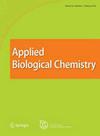蜡样芽孢杆菌食品分离株毒素基因PCR分析
Journal of the Korean Society for Applied Biological Chemistry
Pub Date : 2008-01-01
DOI:10.3839/JKSABC.2008.046
引用次数: 18
摘要
采用聚合酶链式反应(PCR)对71株蜡样芽孢杆菌(12份参考文献和59份食品分离株)进行了5种不同肠毒素基因(nheABC、hblCDA、entFM、cytK和bceT)和1种呕吐毒素cereulide合成酶基因(ces)的检测。PCR分析结果显示,所有蜡样芽孢杆菌菌株均有8种产毒模式;他们都带着entFM和nabc。hblCDA、cytK和bceT的含量因产肠毒素菌株的不同而不同,其中hblCDA在食物分离菌株中检出的频率最低。只有5种蜡样芽孢杆菌菌株携带与呕吐型食物中毒有关的细菌;然而,这些菌株缺乏hblCDA、cytK和bceT。本文章由计算机程序翻译,如有差异,请以英文原文为准。
Toxin Gene Profiling of Bacillus cereus Food Isolates by PCR
Seventy-one Bacillus cereus strains (12 references and 59 food isolates) were analyzed for the occurrence of five different enterotoxin genes (nheABC, hblCDA, entFM, cytK, and bceT) and one emetic toxin cereulide synthetase gene (ces) by PCR (polymerase chain reaction). PCR analysis revealed eight toxigenic patterns in all B. cereus strains tested; they all carried both entFM and nheABC. The presence of hblCDA, cytK, and bceT varied according to the enterotoxin-producing strains, among which hblCDA was the least frequently detected in the food-isolated strains. Only five B. cereus strains harbored ces, associated with the emetic type of food poisoning; however, these strains were devoid of hblCDA, cytK, and bceT.
求助全文
通过发布文献求助,成功后即可免费获取论文全文。
去求助
来源期刊

Journal of the Korean Society for Applied Biological Chemistry
FOOD SCIENCE & TECHNOLOGY-FOOD SCIENCE & TECHNOLOGY
自引率
0.00%
发文量
0
审稿时长
4-8 weeks
 求助内容:
求助内容: 应助结果提醒方式:
应助结果提醒方式:


